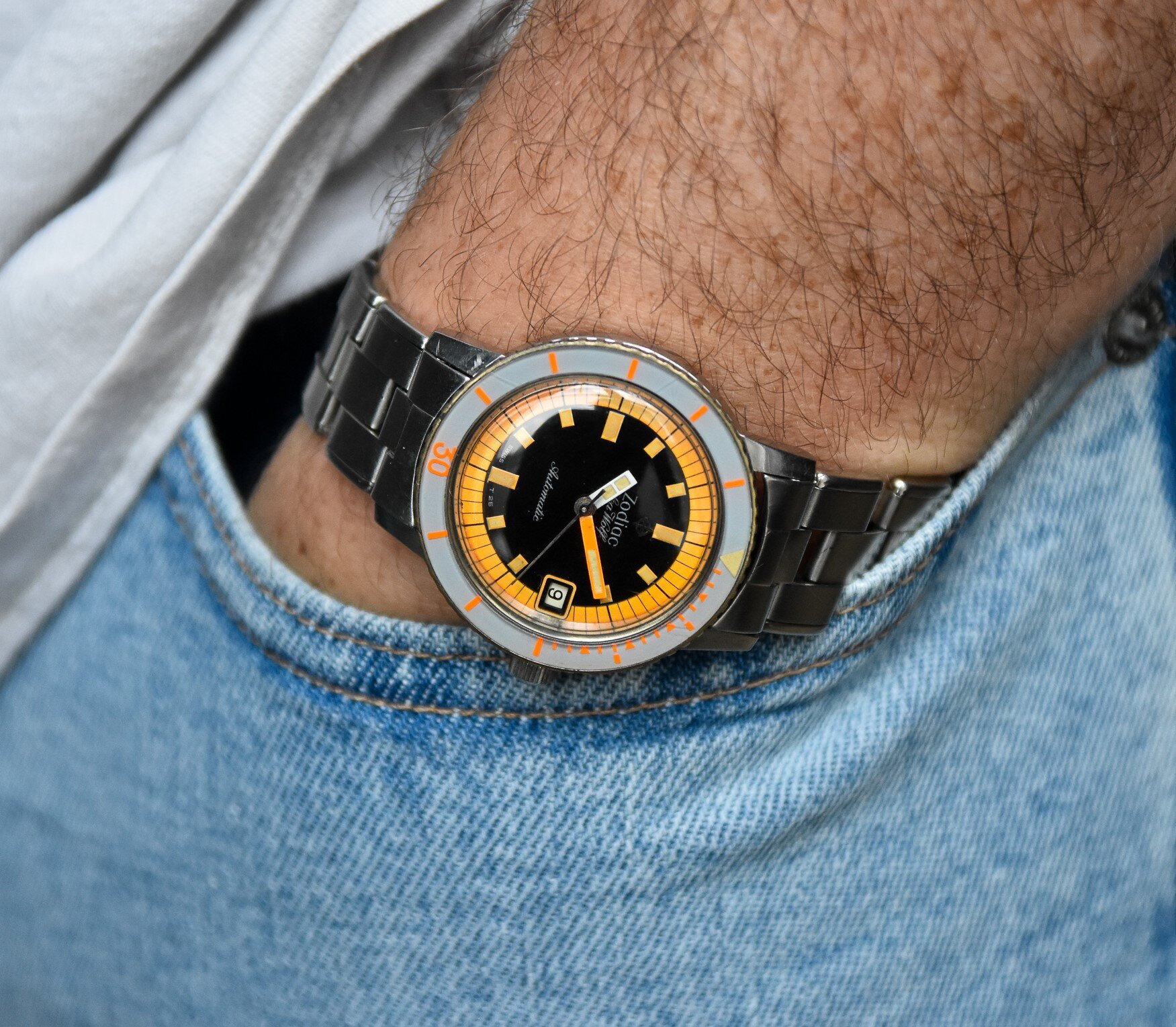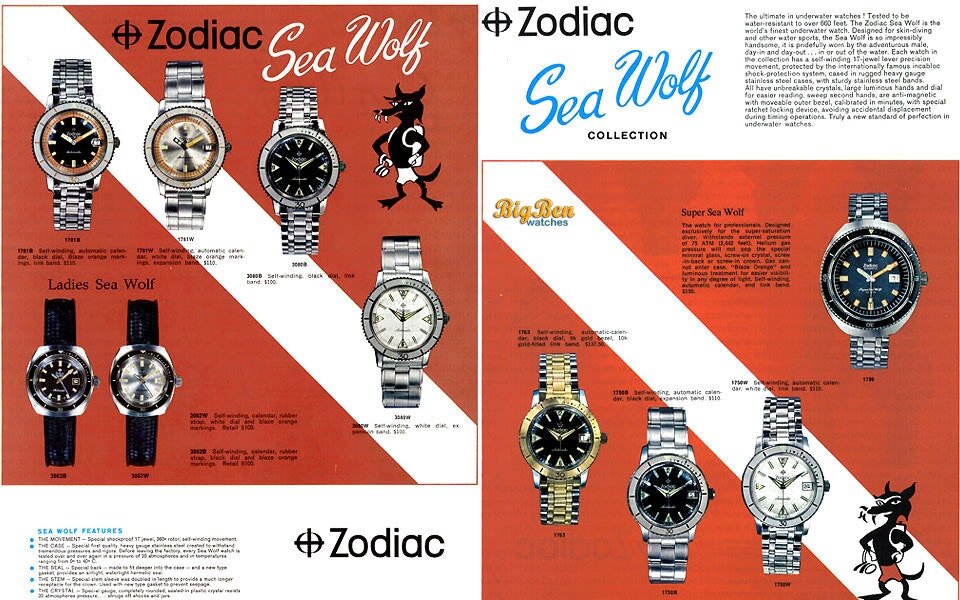By: Max Braun
Have you ever lusted after a watch, only to fall out of love with it, only to start yearning for it again, buy it, and then have it wildly surpass expectations? That was the case with the Zodiac Sea Wolf I recently purchased for my collection.
Members of the watch community often refer to the Rolex Submariner or the Blancpain Fifty Fathoms as the first purpose-built dive watches available to the public. What I don’t usually hear is that there was a third dive watch released to the public in 1953, which was announced at Basel Fair alongside the Fifty Fathoms. The brand was Zodiac, and the watch, a Sea Wolf. Put yourself in the shoes of a consumer in 1953 reviewing these new dive timers. A Submariner? Okay, the thing goes underwater. A Fifty Fathoms? Okay, the watch can survive up to ~90 meters. A Sea Wolf? A few seconds of tossing that name around in your head can yield only one result: a “sea wolf” is definitely not a thing and this makes no sense. Mr. Salesman, one Submariner for me please.
Credit: Ad Patina
Into the deep end
When Zodiac released its Sea Wolf at the 1953 Basel Fair, it was the first dive watch, alongside the Fifty Fathoms, to feature a rotating bezel. And with a depth rating of 10 atmospheres (~100 meters), it was actually green lit to go slightly deeper than the Fifty Fathoms (~90 meters). The rest of the story you probably know. The Sub goes on to become the gift du jour for well-heeled, male college grads while the Fifty Fathoms would become a favorite for the inside baseball crowd. And somewhere along the way, we forgot about the Sea Wolf.
Credit: The Marine Corps Gazette (1966)
I first stumbled across these treasures in 2012 or 2013, about a year after beginning to read regularly about vintage watches. As a college student, I could not afford my taste (read: Sub). It’s funny for me to think back to that time because I remember so vividly the frustration of not actually being able to buy any of these things. My interactions with the hobby were limited to reading and looking at pictures on forums — Instagram hadn’t even taken off yet. Moreover, I was in school in Athens, Georgia, and home was Raleigh, North Carolina. Not exactly horological hotbeds. I remember being so taken with these ugly little stepchildren that were, to me, unjustifiably ignored. The little Sea Wolf, with the weird name, the strong history, the cool ads, the fun mascot, and the great colors, all for around a tenth of the price (at the time) of a good vintage Sub. Furthering the credibility of the Sea Wolf is the fact that they were extremely popular with the servicemen of the Vietnam War, right alongside Submariners, GMTs, and the Glycine Airman. But no one, I mean no one, was talking about them.
But alas, even with that discount I couldn’t afford one. So, I filed it in the back of my mind and made a promise to myself. When I was finally able to afford one, I would acquire the best one I could, as something of an homage to my early years in the hobby — an outsider for an outsider. Over the years, I would keep an eye on the market for these (namely the late 60’s/early 70’s references that had evolved to a more exotic-looking dial with an orange chapter ring and an acrylic, rather than steel, bezel) and generally noticed two trends (though these are hardly unique to the Sea Wolf): 1) fewer and fewer exceptional examples were surfacing and 2) prices began to tick up accordingly. And so in late 2020, I had become determined to locate an exotic-dial example in top condition (reference 722-946 for those of you keeping score at home). Which meant calling Eric Wind, a vintage watch dealer in Palm Beach, Florida.
Hungry like the wolf
Credit: Big Ben Watches
Funnily enough, Eric almost managed to talk me out of buying the watch when I first expressed my interest. At 36mm, the exotic dial reference wears on the smaller size, especially when compared to other divers of the time, due mainly to the reduced surface area of the inner-dial (had to clear space for that orange chapter ring), and the width of the bezel. Dejected, I then decided to move on to a few other watches and my pursuit of the Sea Wolf fizzled.
Several weeks (and two watches) later, I received an unexpected phone call from Eric. He proceeded to tell me that he had not one, but two stellar examples of the watch in his possession. Try to imagine my confusion/frustration/excitement (probably in that order) when the same guy who talked me out of chasing the thing not 6 weeks ago is now telling me there are two killer examples available for sale. I’m up sh*t creek without a paddle at this point — I had just purchased two other watches and was tapped out financially. Not to worry, Eric said, while the first one would soon go to Hodinkee (you may remember this tasty piece of tropicalization), the second example required service and wouldn’t be available for several weeks. This was my window to perform the “I can’t, but maybe, oh what the hell” game we all know and love. When I expressed my concern about the size, Eric offered to ship the watch to me free of charge so that I could try it on. Most watch lovers will recall the various times in their lives when a seller of a desirable piece managed to strike the word “No” right out of their vocabularies.
24 hours later this thing shows up on my doorstep:
It will surprise approximately zero people that I knew instantly this was to be a keeper. In terms of condition, this watch is as good as I’ve seen. Unpolished, virtually no scratching on the case, few scratches to the bezel, original crown, all lume intact, the color of chapter ring has held up well, original bracelet. I was smitten!
I know this watch will always hold a special place in my collection as a vivid reminder of my first days being interested in vintage watches, and as sort of a marker that there can be great joy in chasing some of the watches that, for one reason or another, never got their due.






